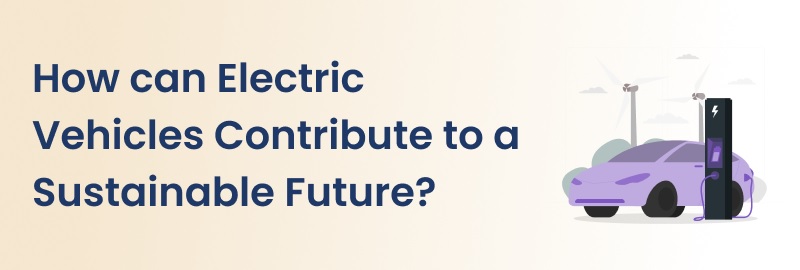Electric vehicles (EVs) have emerged as a possible approach to reduce the negative environmental consequences of traditional internal combustion engine (ICE) cars with the goal of a sustainable future. As the globe grapples with the difficulties of climate change and rising carbon emissions, electric vehicle adoption has the potential to revolutionize transportation and pave the way for a cleaner, greener future.

This blog will dig into the numerous ways that electric cars may contribute to a sustainable future, such as lowering greenhouse gas emissions, improving air quality, increasing renewable energy integration, and encouraging technological innovation. But to delve more deeply into electric cars you can also opt for Electric Vehicle Course.
Reducing Greenhouse Gas Emissions
One of the most compelling reasons why electric vehicles (EVs) are key to a sustainable future lies in their ability to significantly reduce greenhouse gas emissions. The transportation sector is a major contributor to global carbon dioxide (CO2) emissions, primarily due to the combustion of fossil fuels in traditional internal combustion engine (ICE) vehicles. However, EVs offer a cleaner and greener alternative.
- Shifting from Fossil Fuels to Electricity:
EVs run on electricity stored in rechargeable batteries, eliminating the need for fossil fuels. As the global energy grid becomes increasingly decarbonized, with a growing share of renewable energy sources, the emissions associated with charging EVs will decrease even further. Renewable energy, such as solar and wind power, can be harnessed to generate the electricity required to charge EVs, resulting in a substantial reduction in greenhouse gas emissions compared to ICE vehicles.
- Lower Lifecycle Emissions:
Even when considering the emissions generated during the production of electricity, studies consistently show that EVs have lower lifecycle emissions than their ICE counterparts. This is due to the higher energy efficiency of electric drivetrains and the cleaner energy sources used in electricity generation. Electric motors are more efficient than internal combustion engines, resulting in less energy waste and lower emissions per kilometer traveled. Additionally, power plants that generate electricity often have more advanced emission control technologies in place compared to individual vehicles, further reducing overall emissions.
- Emissions Reduction in Urban Areas:
EVs have a particularly significant impact on reducing emissions in densely populated urban areas, where air pollution from vehicles poses a major threat to public health. In cities, the concentration of vehicles is high, leading to increased emissions of nitrogen oxides (NOx), particulate matter (PM), and volatile organic compounds (VOCs). These pollutants contribute to respiratory problems, cardiovascular diseases, and premature deaths. By transitioning to EVs, cities can experience a drastic improvement in air quality, creating healthier and more livable environments for their residents.
- Indirect Emissions Reduction:
Electric vehicles not only reduce direct emissions but also indirectly contribute to emissions reduction. As the demand for EVs grows, there is an increased focus on developing and expanding renewable energy infrastructure. This, in turn, leads to a more significant deployment of solar, wind, and other renewable energy sources. As these clean energy technologies become more prevalent, the overall emissions from the energy sector decrease, benefiting all electricity consumers, including EV owners.
- EVs as a Catalyst for Emission Reduction Policies:
The increasing adoption of EVs has also served as a catalyst for the development of emission reduction policies. Governments around the world are implementing measures to incentivize EV purchases, such as tax credits, subsidies, and preferential treatment in terms of parking and tolls. These policies not only encourage individuals to switch to EVs but also create a positive feedback loop by fostering market growth and driving further technological advancements.
Enhancing Air Quality
Another pressing issue that electric vehicles address is the adverse impact of vehicle emissions on air quality. Conventional vehicles emit pollutants such as nitrogen oxides, particulate matter, and volatile organic compounds, which contribute to air pollution and have detrimental effects on human health. By transitioning to electric vehicles, we can significantly reduce these harmful emissions, leading to cleaner and healthier air.
Improved air quality translates into numerous health benefits, including reduced respiratory problems, decreased incidence of cardiovascular diseases, and a lower risk of premature deaths. Moreover, electric vehicles operate more quietly than their combustion engine counterparts, thus mitigating noise pollution. By fostering a shift towards electric mobility, we can create urban environments that are not only sustainable but also conducive to the well-being of their inhabitants.
Promoting Renewable Energy Integration
The widespread adoption of electric vehicles offers a unique opportunity to integrate renewable energy sources into the power grid more effectively. As electric vehicles require electricity for charging, their increased presence can serve as a valuable storage reservoir for renewable energy. By utilizing smart charging infrastructure and vehicle-to-grid (V2G) technologies, electric vehicles can actively participate in the energy market, enhancing grid stability and supporting the integration of intermittent renewable energy sources.
During times of excess renewable energy generation, such as sunny or windy days, electric vehicles can charge their batteries, effectively storing the surplus energy. Conversely, during peak demand periods or when renewable energy generation is low, electric vehicles can discharge their stored energy back into the grid, reducing strain on traditional power plants and helping to balance electricity supply and demand. This symbiotic relationship between electric vehicles and renewable energy fosters a more sustainable and resilient energy ecosystem.
Fostering Technological Innovation
The widespread adoption of electric vehicles is propelling technological innovation across multiple sectors. As the demand for electric vehicles increases, companies are investing heavily in research and development, leading to advancements in battery technology, charging infrastructure, and autonomous driving capabilities. These advancements not only benefit the automotive industry but also spill over into other sectors, driving progress in energy storage, grid management, and urban planning.
The development of more efficient and affordable batteries has been a focal point of innovation in the electric vehicle industry. Breakthroughs in battery technology, such as solid-state batteries or lithium-air batteries, promise increased energy density, longer range, and shorter charging times. These advancements will not only make electric vehicles more practical and accessible but also have profound implications for the wider adoption of renewable energy storage systems.
Conclusion
Electric vehicles represent a compelling solution to the environmental and sustainability challenges posed by traditional combustion engine vehicles. Through their ability to reduce greenhouse gas emissions, improve air quality, promote renewable energy integration, and foster technological innovation, electric vehicles are driving us toward a more sustainable future. However, widespread adoption requires concerted efforts from governments, businesses, and individuals to invest in charging infrastructure, incentivize electric vehicle purchases, and accelerate the transition to renewable energy sources. By embracing the potential of electric vehicles, we can shape a cleaner, greener, and more sustainable world for future generations.
 World inside pictures Collect and share the best ideas that make our life easier
World inside pictures Collect and share the best ideas that make our life easier








